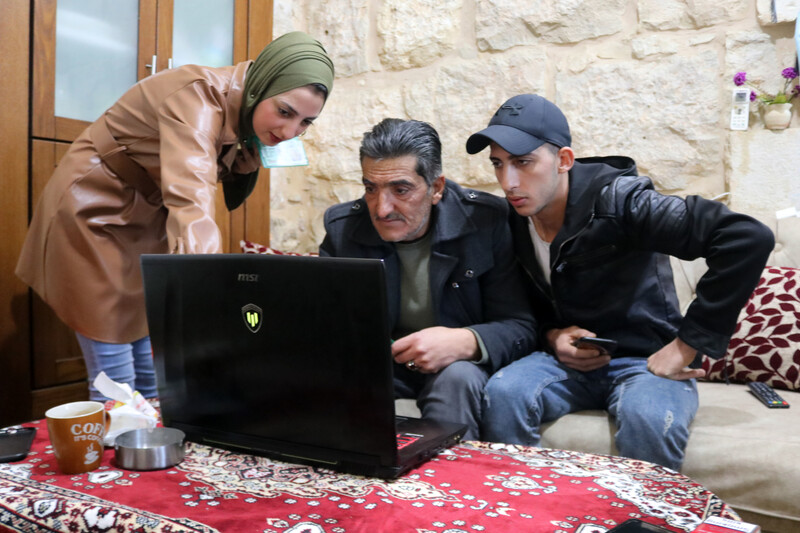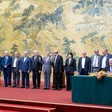Power Suits 2 February 2021

Members of the Abu Shamsiyeh family in Hebron register online to vote in elections scheduled for later this year.
APA imagesOn 15 January, Mahmoud Abbas, the Palestinian Authority leader unveiled plans for elections in the occupied West Bank and Gaza.
Ostensibly called to renew the popular legitimacy of the main political factions, heal the Fatah-Hamas rift while countering Israeli accusations that Abbas does not speak for all Palestinians, the date of the decree had much to do with Joe Biden’s inauguration five days later.
The PA clearly hopes that the new US administration will relaunch peace efforts and revive the fortunes of a body that is running out of time.
Elections are also seen in some quarters as the best way to overcome a 14-year split between the main factions that many identify as one of the greatest weaknesses on the Palestinian political scene.
But there is a good chance that for all the bluster around the vote, none will take place. And, even if they do, a confluence of interests between Fatah and Hamas mitigate against any much-needed dramatic changes to Palestinian policy or strategy.
Why now?
Abbas is keen to establish his democratic credentials with the new US administration. After all, since his election 16 years and four presidential terms ago, he has never again faced the electorate.
He needs an election win in order to represent both areas of occupied territory, boost his and the PA leadership’s credibility and improve chances of reform to a relationship with the US that has always been deeply problematic for Palestinians.
Effectively tied to progress in the peace process that started with the Oslo accords in 1993, Palestinian-US relations have been to an unusual degree hostage to the staunchly pro-Israel US Congress.
Anti-terrorism legislation, both before Oslo and since, as well as provisions in appropriations bills ensuring congressional oversight of the conditions under which the PA might receive US funding, in effect grant the legislature the power to determine how the PA should spend its money, how it can conduct its international relations and how it must organize its political affairs.
If Abbas, or anyone else wedded to the survival of the PA and a two-state process, is to make any progress at all, this relationship must change. It is hopelessly stacked against the Palestinian side and in favour of Israel, which can always count on its many friends in Congress.
And a Palestinian leader with a fresh popular mandate might at least press for such changes from a new White House.
However, even if so inclined – and there is no evidence of this – with priorities elsewhere, it is deeply unlikely that Biden is interested in taking on Congress on behalf of Palestinians.
So Abbas will face elections without much promise of anything from Washington other than perhaps a resumption of US funding.
Indeed, Biden’s secretary of state, Antony Blinken, has already made clear that the new administration will not walk back Trump policy on Jerusalem, which, according to Blinken, is Israel’s capital and where the US will keep its embassy.
Backroom deals
Shorn of Jerusalem, one of his main political planks, Abbas thus faces an electorate where he is already deeply unpopular.
A December poll by the Palestinian Center for Policy Survey and Research found that more than two-thirds of respondents wanted Abbas to resign after he announced a resumption of security coordination with Israel in the wake of the US presidential vote.
The same poll also found that Abbas would lose a presidential election against Hamas leader Ismail Haniyeh. That is despite how Abbas’ Fatah party held a slender 4 percent advantage over Hamas for elections to the Palestinian Legislative Council.
Hamas could, of course, decide not to run a presidential candidate. It has not yet announced if it will, and it didn’t in 2005, when Abbas was elected against a slate of independents and representatives of smaller parties (though Hamas had then yet to decide to participate in elections outside municipal ballots).
Insisting on its right to armed resistance, Hamas also remains on a number of official lists of terrorist groups. They include those of the US and European Union, from which the PA has traditionally drawn most of its funding.
Hamas’ victory in 2006 elections caused both the EU and US to withhold funding for the PA and helped set the stage for the violent insurrection in Gaza the following year that resulted in the Palestinian divide.
Hamas officials may calculate that the world this time might accept a Palestinian Legislative Council in which Hamas, should it garner a majority, could stay in opposition, but would have to react if Haniyeh became president.
Indeed, it may not be alone in this calculation.
The Palestinian political division is deeply unpopular, and a source of embarrassment to the PA presidency.
It is also ostensibly an impediment to lifting restrictions on Gaza (though Israel long before Hamas won elections and took over the Gaza Strip reneged on internationally-mediated agreements over Gaza’s development, most notably the 2005 Agreement on Movement and Access).
In view of that, it is not inconceivable that the two factions have reached an informal agreement to ensure that whatever the outcome of elections, the PA won’t be cut off again.
Predictable Israelis
In fact, just three months ago, there were rumors – quickly denied – that Hamas and Fatah were considering a joint list to run in elections.
All of which assumes, of course, that the elections will actually take place.
Both Fatah and Hamas were quick to announce their support of the polls. But both factions also stipulated that their participation hinged on a vote being allowed to go ahead in occupied East Jerusalem.
Israel did allow a vote there in 2006, though with serious restrictions on campaigning in the city where Hamas-affiliated candidates were prohibited.
It seems highly unlikely, however, that the right wing constellation currently in power – or expected to be in power after Israel’s own March vote – will be as malleable.
Israel – being Israel – could thus easily provide both Fatah and Hamas with a ready-made way out of an election.
This, in turn, could well suit both parties, and not just because a vote would then pose no new obstacles to international funding.
Fatah would not have to risk another potentially embarrassing loss at the ballot box or further exposure of divisions within the party where would-be rivals to the octogenarian Abbas are constantly lurking in the background.
These include most notably imprisoned Fatah leader Marwan Barghouti – consistently polling as the most popular Palesitnian leader – or the exiled former PA security chief Muhammad Dahlan, who has been explicitly banned from mounting his own presidential bid.
That would suit Hamas because it would not have to find a way of reconciling any adherence to armed resistance with active participation in official PA institutions, the existence of which is predicated upon coordination with the very military it is meant to be fighting.
What legitimacy?
But this also suggests that both factions can live with a status quo that is clearly disastrous for Palestinians and their struggle.
This epitomizes the current stagnancy of the Palestinian political scene in which factions are seemingly unwilling to risk what little powers they have secured for themselves in their tiny corners of Palestine for any greater good or grander political strategy.
Perhaps of most potential significance therefore would be the mooted vote for the Palestinian National Council, the legislative body of the Palestine Liberation Organization and the only election that might feasibly be said to represent all Palestinians.
The PLO remains the official representative of the Palestinian people everywhere.
The advent of the PA in the 1990s, however, saw more and more emphasis placed on that body as a source of political direction and leadership.
And the erosion of the PLO’s importance has seen an accompanying erosion of the role of Palestinians outside Palestine – just over half of all Palestinians at end of 2020, many in refugee camps in neighboring countries.
The PNC has not properly assembled since 1988, when it was the body to deliver the Palestinian Declaration of Indpendence that announced the PLO’s support for a two-state solution on 1967 boundaries and set the stage for the subsequent peace process – and its failure.
Some have argued that reinvigorating the PLO and restructuring it away from factional lines to be truly representative of the Palestinian people is the only path to untangling Palestinian politics from its current impotency.
But it seems an unlikely source of salvation at a moment when the PLO’s leadership itself is not interested in reform.
More likely, election or no election, is a period of normalcy as the Biden administration seeks to undo some of the damage wrought by Trump, even if not all.
This calm won’t last, though a resumption of foreign aid will offer some welcome humanitarian relief.
Neither the US administration nor any Palestinian leadership of any faction (let alone, of course, Israel, which is happily gobbling up more and more land in the meanwhile) has offered any new thinking so far.
And absent fresh ideas, the post-Trump calm will eventually be replaced by a final upheaval as the PA is at last consumed by its own irrelevance.





Comments
Democracy
Permalink Frank Dallas replied on
Of course, the result of the 2006 election was never supposed to happen. Neither Israel nor the US thought it would, which is why they punished the people for voting the wrong way (as they always do). The Palestinian division in truly tragic and the PLO may be the best route to unity. Division serves the interests of Israel and the US (and the EU which by and large clings to the US's coat-tails). The essential point, of course, is that real democracy is prevented by Israel and the US. The Palestinians are in a desperate situation, and should the PLO revive and unify, the Israelis will respond with violence (they always do). As ever, what we see is that problem cannot be solved in situ. It is change in the US which is crucial. Not till the US begins to support the democracy it claims to believe in will the Palestinians have a chance. The PA may be hollowed out, but that is significantly because it serves Israel and the US for it to be so. It is not the PA, or any other Palestinian body which will set the Palestinians free, but us. Those of us who have the freedom to speak, write and organise. We have to bring about the change in the US, in Europe which will scupper Israel's domination, exploitation and brutalisation. The responsibility lies with us.
So where now & what now?
Permalink StevoR replied on
So where now & what now?
What do think will happen?
What would you like to see happen & how can we make what you'd like to see happen, happen?